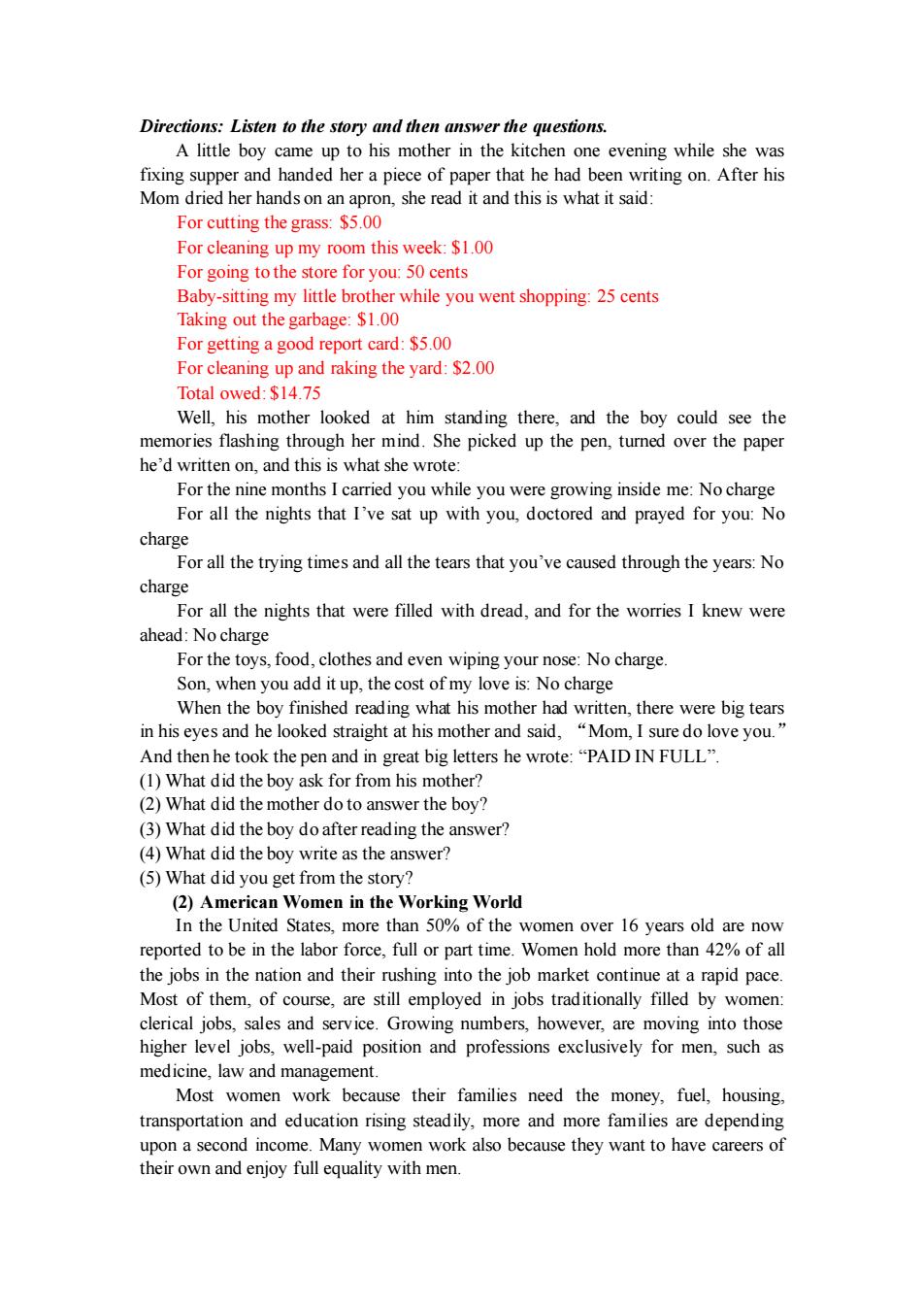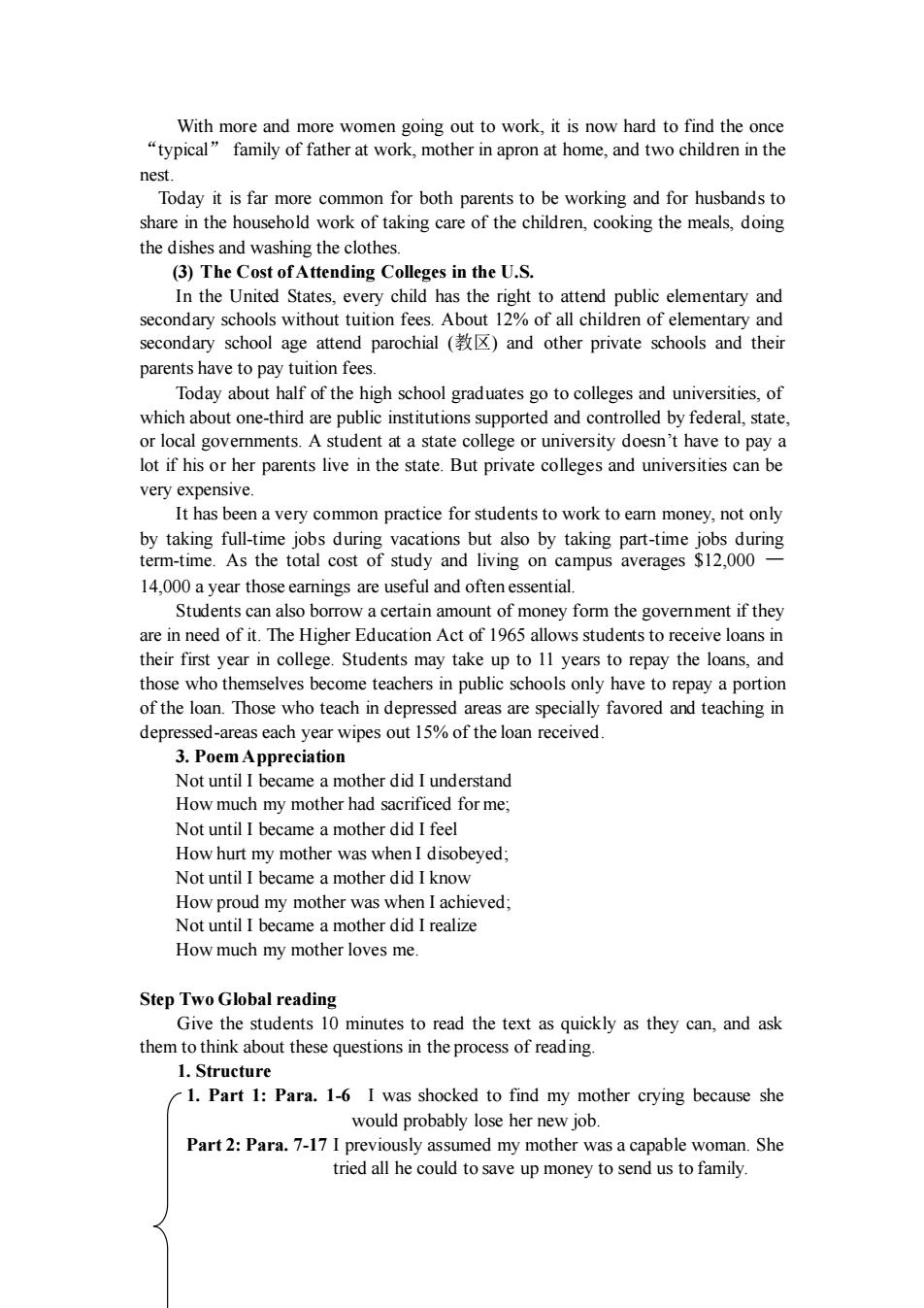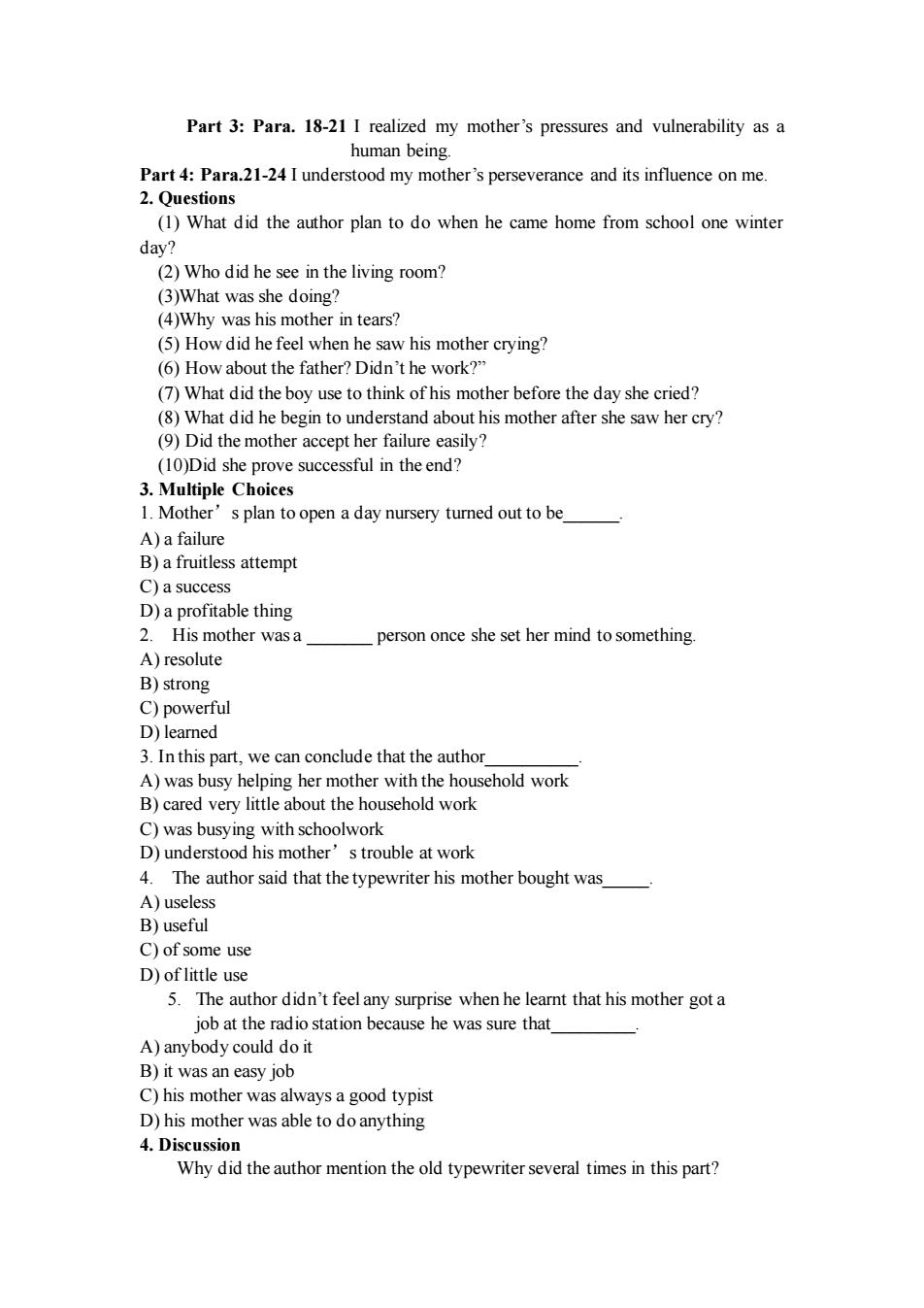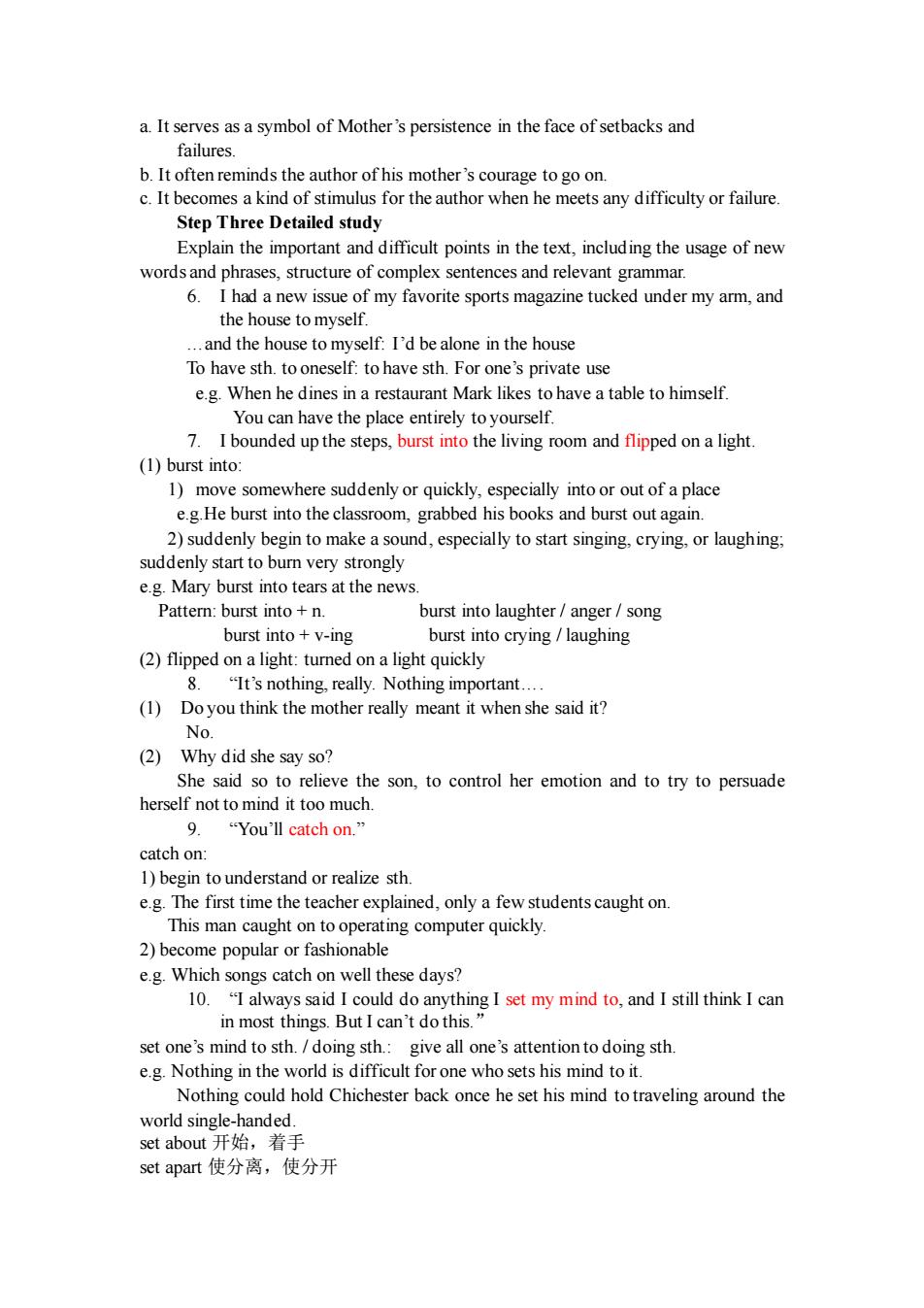
Unit 5 The Day Mother Cried I.Teaching Aims 1.Help the students to get the general idea of the article. 2.Enlarge the students'vocabulary by learing the new words and doing the cises Help the students understand our parents. 4.Help the students to build up their language skills through more exercises on oral practice,phrases and expression,grammar,writing.etc. II.Key and Difficult Points 1.New Words and Phrases Burst into,flip on,catch on,set one's mind to sthdoing sth.,stand in sb's way,send away for,run out,help out,hold back,rack,recall 2.Sentences 1.I had a new issue of my favorite sports magazine tucked under my arm, 2. 3.It wasn't long before she had a full enrollment and a waiting list. 4.In that moment,feeling Mother's back racked with emotion,I understood for the first time her vulnerability. 5. memento,but what it recalls for me is not quite what recalled for III.Teaching Methods Discussion,explanation,ask and answer IV.Time:4 periods V.Teaching procedures: Step one Introduction 1.Warents the following topics to discuss and then ask them to answer Give the these questions. (1)Does your mother work? (2)What's her job? (3)Who does the household work,your father or your mother or both of them? me?Why or why not? (5)Doyour parents understand you? (6)Doyou really understand your parents? (7)Have you ever seen your mother(or father)cry?When was that and why? 2.Background Information (1)Mother's Love
Unit 5 The Day Mother Cried I. Teaching Aims 1. Help the students to get the general idea of the article. 2. Enlarge the students’ vocabulary by learning the new words and doing the vocabulary exercises. 3. Help the students understand our parents. 4. Help the students to build up their language skills through more exercises on oral practice, phrases and expression, grammar, writing, etc. II. Key and Difficult Points 1. New Words and Phrases Burst into, flip on, catch on, set one’s mind to sth/doing sth., stand in sb’s way, send away for, run out, help out, hold back, rack, recall 2. Sentences 1. I had a new issue of my favorite sports magazine tucked under my arm, and the house to myself. 2. I felt helpless and out of place. 3. It wasn’t long before she had a full enrollment and a waiting list. 4. In that moment, feeling Mother’s back racked with emotion, I understood for the first time her vulnerability. 5. It is a memento, but what it recalls for me is not quite what it recalled for Mother. III. Teaching Methods Discussion, explanation, ask and answer IV. Time: 4 periods V. Teaching procedures: Step one Introduction 1. Warm-up questions: Give the students the following topics to discuss and then ask them to answer these questions. (1) Does your mother work? (2) What’s her job? (3) Who does the household work, your father or your mother or both of them? (4) Do you often help out a little at home? Why or why not? (5) Do your parents understand you? (6) Do you really understand your parents? (7) Have you ever seen your mother (or father) cry? When was that and why? 2. Background Information (1) Mother’s Love

Directions:Listen to the story and then answer the questions. A little boy mother in the kite one evening while she wa her a piece of paper that he had been writing on.After his Mom dried her hands on an apron,she read it and this is what it said: For cutting the grass:$5.00 For cleaning up my room this week:$1.00 For going Baby-sttingmyie bro while you went shopping:25 cents Taking out the garbage:$1.00 For getting a good report card:$5.00 For cleaning up and raking the yard:$2.00 Total owed:S14 75 Well,his mother looked at him standin the memoris shin throuh her mind.She pickdhe over the paper he'd written on,and this is what she wrote For the nine months I carried you while you were growing inside me:No charge For all the nights that I've sat up with you,doctored and prayed for you:No charg For all the trying times and all the tears that you've caused through the years:No charge For all the nights that were filled with dread,and for the worries I knew were ahead:No charge For the toys,food,clothes and even wiping your nose:No charge Son,wh en you add i up,the ecost of my love is:No charge When the boy finished reading what his mother had written,there were big tears in his eyes and he looked straight at his mother and said, "Mom,I sure do love you. And then he took the pen and in great big letters he wrote:"PAID IN FULL". (1)What did the boy ask for from his mother? (2)What did the mother doto a w er the boy? ()What did the boy doafter reading the answer? (4)What did the boy write as the answer? (5)What did you get from the story? (2)American Women in the Working World In the United States,more than 50%of the women over 16 years old are now reported to be in the labor force.full or part time.Women hold more than 4%of all the jobs in the nation and their rushing into the job market continue at a rapid pace. Most of them,of course,are still employed in jobs traditionally filled by women: clerical jobs,sales and service.Growing numbers.however,are moving into those higher level jobs,well-paid position and professions exclusively for men,such as medicine,law and ma gement Most women work because their families need the money,fuel,housing. transportation and education rising steadily,more and more families are depending upon a second income.Many women work also because they want to have careers of their own and enjoy full equality with men
Directions: Listen to the story and then answer the questions. A little boy came up to his mother in the kitchen one evening while she was fixing supper and handed her a piece of paper that he had been writing on. After his Mom dried her hands on an apron, she read it and this is what it said: For cutting the grass: $5.00 For cleaning up my room this week: $1.00 For going to the store for you: 50 cents Baby-sitting my little brother while you went shopping: 25 cents Taking out the garbage: $1.00 For getting a good report card: $5.00 For cleaning up and raking the yard: $2.00 Total owed: $14.75 Well, his mother looked at him standing there, and the boy could see the memories flashing through her mind. She picked up the pen, turned over the paper he’d written on, and this is what she wrote: For the nine months I carried you while you were growing inside me: No charge For all the nights that I’ve sat up with you, doctored and prayed for you: No charge For all the trying times and all the tears that you’ve caused through the years: No charge For all the nights that were filled with dread, and for the worries I knew were ahead: No charge For the toys, food, clothes and even wiping your nose: No charge. Son, when you add it up, the cost of my love is: No charge When the boy finished reading what his mother had written, there were big tears in his eyes and he looked straight at his mother and said, “Mom, I sure do love you.” And then he took the pen and in great big letters he wrote: “PAID IN FULL”. (1) What did the boy ask for from his mother? (2) What did the mother do to answer the boy? (3) What did the boy do after reading the answer? (4) What did the boy write as the answer? (5) What did you get from the story? (2) American Women in the Working World In the United States, more than 50% of the women over 16 years old are now reported to be in the labor force, full or part time. Women hold more than 42% of all the jobs in the nation and their rushing into the job market continue at a rapid pace. Most of them, of course, are still employed in jobs traditionally filled by women: clerical jobs, sales and service. Growing numbers, however, are moving into those higher level jobs, well-paid position and professions exclusively for men, such as medicine, law and management. Most women work because their families need the money, fuel, housing, transportation and education rising steadily, more and more families are depending upon a second income. Many women work also because they want to have careers of their own and enjoy full equality with men

With mor and more women going g out to work,it is now hard to find the once “typical family of father at work,mother in apron at home,and two children in the nest. Today it is far more common for both parents to be working and for husbands to share in the household work of taking care of the children,cooking the meals,doing the dishes and washing the clothes. 3)The Cost ofAttending Colleges in the U.S. In the United States,every child has the right to attend public elementary and secondary schools without tuition fees.About 12%of all children of elementary and secondary school age attend parochial (and other private schools and their parents have to pay tuition fees Today about half of the high school graduates go to colleges and universities.of which about one-third are public institutions supported and controlled by federal state or local goverments.A student at a state college or university doesn't have to pay a lot if his or her parents live in the state.But private colleges and universities can be very expensive. It has been a very common practice for students to work to earn money,not only during As the total cos o study and ut also by taking part-tim 00 14.000 a vear those earnings are useful and often essential Students can also borrow a certain amount of money form the government if they are in need of it.The Higher Education Act of 1965 allows students to receive loans in their first y ar in c lle Stude may take up to 11 years repay the loans,and those who themselves become teachers in public schools only have to o repay a portio of the loan.Those who teach in depressed areas are specially favored and teaching in depressed-areas each year wipes out 15%of the loan received. 3.Poem Appreciation Not until I be came a mother did Iunderstand How m my mother hac rifice ed for me Not until I became a mother did I feel How hurt my mother was when I disobeyed; Not until i became a mother did i know How proud my mother was when I achieved: until Ibe mother How much my mother loves me Step Two Global reading Give the students 10 minutes to read the text as quickly as they can,and ask them to think about these que tions in the e proc ess of reading 1.Structur 1.Part 1:Para.1-6 I was shocked to find my mother crying because she would probably lose her new job. Part 2:Para.7-17 I previously assumed my mother was a capable woman.She tried all he could to save up money to send us to family
With more and more women going out to work, it is now hard to find the once “typical” family of father at work, mother in apron at home, and two children in the nest. Today it is far more common for both parents to be working and for husbands to share in the household work of taking care of the children, cooking the meals, doing the dishes and washing the clothes. (3) The Cost of Attending Colleges in the U.S. In the United States, every child has the right to attend public elementary and secondary schools without tuition fees. About 12% of all children of elementary and secondary school age attend parochial (教区) and other private schools and their parents have to pay tuition fees. Today about half of the high school graduates go to colleges and universities, of which about one-third are public institutions supported and controlled by federal, state, or local governments. A student at a state college or university doesn’t have to pay a lot if his or her parents live in the state. But private colleges and universities can be very expensive. It has been a very common practice for students to work to earn money, not only by taking full-time jobs during vacations but also by taking part-time jobs during term-time. As the total cost of study and living on campus averages $12,000 — 14,000 a year those earnings are useful and often essential. Students can also borrow a certain amount of money form the government if they are in need of it. The Higher Education Act of 1965 allows students to receive loans in their first year in college. Students may take up to 11 years to repay the loans, and those who themselves become teachers in public schools only have to repay a portion of the loan. Those who teach in depressed areas are specially favored and teaching in depressed-areas each year wipes out 15% of the loan received. 3. Poem Appreciation Not until I became a mother did I understand How much my mother had sacrificed for me; Not until I became a mother did I feel How hurt my mother was when I disobeyed; Not until I became a mother did I know How proud my mother was when I achieved; Not until I became a mother did I realize How much my mother loves me. Step Two Global reading Give the students 10 minutes to read the text as quickly as they can, and ask them to think about these questions in the process of reading. 1. Structure 1. Part 1: Para. 1-6 I was shocked to find my mother crying because she would probably lose her new job. Part 2: Para. 7-17 I previously assumed my mother was a capable woman. She tried all he could to save up money to send us to family

Part 3:Para.18-21 I realized my mother's pressures and vulnerability as a human being. Part 4:Para.21-24I understood my mother's perseverance and its influence on me. 2.Questions (1)What did the author plan to do when he came home from school one winter day? (2)Who did he see in the living room? (3)What was she doing (4)Why was his mother in tears? (5)How did he feel when he saw his mother crying? (6)How about the father?Didn't he work?" (7)What did the boy use to think of his mother before the day she cried? (8)What did he begin to ur nde rstand abou his mother after she saw her cry? (9)Did the mother accept her failure easily (10)Did she prove successful in the end? 3.Multiple Choices 1.Mother's plan to open a day nursery turned out to be A)a failure C)a success D)a profitable thing 2.His mother wasa person once she set her mind to something. A)resolute B)strong C)powerful D)learned 3.In this part,we can conclude that the author A)was busy helping her mother with the household work B)cared very little about the household work C)was busying withs hoolwork D)understood his mother's trouble at work 4.The author said that the typewriter his mother bought was A)useless B)useful C)of some use D)of little use 5.The author didn't feel any surprise when he learnt that his mother got a job at the radio station because he was sure that A)anybody could do it neasy job D)his mother was able to do anything 4.Discussion Why did the author mention the old typewriter several times in this part?
Part 3: Para. 18-21 I realized my mother’s pressures and vulnerability as a human being. Part 4: Para.21-24 I understood my mother’s perseverance and its influence on me. 2. Questions (1) What did the author plan to do when he came home from school one winter day? (2) Who did he see in the living room? (3)What was she doing? (4)Why was his mother in tears? (5) How did he feel when he saw his mother crying? (6) How about the father? Didn’t he work?” (7) What did the boy use to think of his mother before the day she cried? (8) What did he begin to understand about his mother after she saw her cry? (9) Did the mother accept her failure easily? (10)Did she prove successful in the end? 3. Multiple Choices 1. Mother’s plan to open a day nursery turned out to be______. A) a failure B) a fruitless attempt C) a success D) a profitable thing 2. His mother was a _______ person once she set her mind to something. A) resolute B) strong C) powerful D) learned 3. In this part, we can conclude that the author__________. A) was busy helping her mother with the household work B) cared very little about the household work C) was busying with schoolwork D) understood his mother’s trouble at work 4. The author said that the typewriter his mother bought was_____. A) useless B) useful C) of some use D) of little use 5. The author didn’t feel any surprise when he learnt that his mother got a job at the radio station because he was sure that_________. A) anybody could do it B) it was an easy job C) his mother was always a good typist D) his mother was able to do anything 4. Discussion Why did the author mention the old typewriter several times in this part?

a.It serves as a symbol of Mother's persistence in the face of setbacks and failures b.It often reminds the author of his mother's courage to go on. c.It becomes a kind of stimulus for the author when he meets any difficulty or failure. Step Three Detailed study Explain the important and difficult points in the text,including the usage of new words an nd phrases,re of relevant grammar 6. Ihad a new issue of my favorite sports magazine tucked under my amm,and the house to myself. .and the house to myself:I'd be alone in the house To have sth.to oneself:to have sth.For one's private use e.g.When he dines in a restaurant Mark likes to have a table to himself. You chave the pace entirelytoyou 7.I bounded up the steps,burst into the living room and flipped on a light. (1)burst into: 1)move somewhere suddenly or quickly.especially into or out of a place e.g He burst into the classroom,grabbed his books and burst out again. 2)suddenly begin to make as und,especially to start singing.crying.or laughing. suddenly start to bum very strongly e.g.Mary burst into tears at the news. Pattern:burst into+n. burst into laughter anger song burst into y-ing burst into crying/laughing (1)Doyou think the mother really meant it when she said it? No (2)Why did she say so? She said so to lieve the son,to control her emotion and to try to persuade herse not to mind it too muc “You''ll catch on. catch on 1)hegin tounderstand or realize sth e.g.The first time the teacher explained,only a few students caught on. This man ca ting computer quic 2)become popular or fashionable e.g.Which songs catch on well these days? 10."I always said I could do anything I set my mind to,and I still think I can in most things.But I can't do this.' set one's mind to sth./doing sth. give all one's attention to doing sth e.g.Nothing in the difficult for one who o sets his mind to it Nothing could hold Chichester back once he set his mind to traveling around the world single-handed. set about开始,着手 set apart使分离,使分开
a. It serves as a symbol of Mother’s persistence in the face of setbacks and failures. b. It often reminds the author of his mother’s courage to go on. c. It becomes a kind of stimulus for the author when he meets any difficulty or failure. Step Three Detailed study Explain the important and difficult points in the text, including the usage of new words and phrases, structure of complex sentences and relevant grammar. 6. I had a new issue of my favorite sports magazine tucked under my arm, and the house to myself. …and the house to myself: I’d be alone in the house To have sth. to oneself: to have sth. For one’s private use e.g. When he dines in a restaurant Mark likes to have a table to himself. You can have the place entirely to yourself. 7. I bounded up the steps, burst into the living room and flipped on a light. (1) burst into: 1) move somewhere suddenly or quickly, especially into or out of a place e.g.He burst into the classroom, grabbed his books and burst out again. 2) suddenly begin to make a sound, especially to start singing, crying, or laughing; suddenly start to burn very strongly e.g. Mary burst into tears at the news. Pattern: burst into + n. burst into laughter / anger / song burst into + v-ing burst into crying / laughing (2) flipped on a light: turned on a light quickly 8. “It’s nothing, really. Nothing important…. (1) Do you think the mother really meant it when she said it? No. (2) Why did she say so? She said so to relieve the son, to control her emotion and to try to persuade herself not to mind it too much. 9. “You’ll catch on.” catch on: 1) begin to understand or realize sth. e.g. The first time the teacher explained, only a few students caught on. This man caught on to operating computer quickly. 2) become popular or fashionable e.g. Which songs catch on well these days? 10. “I always said I could do anything I set my mind to, and I still think I can in most things. But I can’t do this.” set one’s mind to sth. / doing sth.: give all one’s attention to doing sth. e.g. Nothing in the world is difficult for one who sets his mind to it. Nothing could hold Chichester back once he set his mind to traveling around the world single-handed. set about 开始,着手 set apart 使分离,使分开